Top 17 coronavirus myths explained
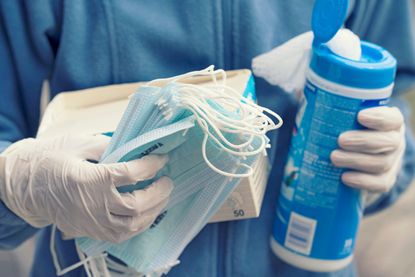
Two NHS GPs gives the lowdown on Covid-19 – and what you need to know to fight it.
NHS GP Dr Gero Baiarda, one of the hundreds of GPs currently on-call at GPDQ - the UK’s leading GP-on-demand service and Dr Dawn Harper, explain 17 of the most common myths about the virus...
1) The virus is a living organism that we can kill
FACT: It’s not alive.
'It’s a protein chain of Ribonucleic Acid within a protective layer of fat. Since the virus is a protein super molecule rather than a living organism, you cannot kill it. It will, however, decay spontaneously given enough time,' says Dr Gero. 'The time it takes to break down depends on the environmental temperature, humidity and type of material upon which it settles.' This quick video explains how washing away this layer of fat with soap destroys the virus...
2) People are most contagious before they even know they have the virus
FACT: This is untrue. 'Infected cells are invaded and destroyed by the virus, allowing millions of new viruses to burst forth and be shed on surfaces or passed to other people,' says Dr Gero. 'Spread is most effective, therefore, in coughed droplets. Patients who show no symptoms, however, can pass on the virus as soon as they are infected.'
3) SARS-COV-2 is a hardy virus
FACT: It isn’t. SARS-COV-2 is surprisingly fragile. 'The only protection it has is a thin outer layer of lipid or fat. That's why any soap or detergent (both of which break down fat) will destroy it - even washing-up liquid works well,' says Dr Gero. 'By dissolving the external lipid layer of the virus, the virus is rendered completely inert and unable to penetrate human cells. Hence why washing hands often with soap and water is so important.'
4) If delivery drivers wear gloves, they won’t spread it
FACT: Wrong. 'Every item that a gloved hand touches can then be contaminated. According to a recent study from the New England Journal of Medicine, the virus can live up to eight hours on cardboard,' says Dr Gero. 'To stay safe, the best advice is not to touch the parcel until ideally the following day.'
GoodtoKnow Newsletter
Parenting advice, hot topics, best buys and family finance tips delivered straight to your inbox.
5) The virus can’t be passed on by food
FACT: It can be transferred easily. 'If someone who has the virus on their hands touches food, it is very likely to become contaminated for many hours,' says Dr Gero. 'To inactivate the virus, food should either be washed or cooked at 65 degrees celsius for at least four minutes.'
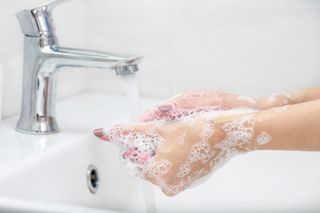
6) Alcohol-based sanitier is as effective as washing your hands with soap and water
FACT: It isn’t. 'Squirting a little bit of alcohol gel on your palms and rubbing them together is not effective. You need to cover the entire surface of both hands, including fingers and thumbs, but this should be done only after the hands are free of any residues - such as after sneezing,' says Dr Gero. 'The small nozzle on bottles of sanitizer are part of the problem, as people assume a small amount is enough.' Watch our video: How to wash your hand properly.
7) Drinking alcohol will prevent people getting the virus
FACT: This is not true. 'The only alcohol that will help to prevent the spread of the SARS-COV-2 is that in hand sanitizer,' says Dr Gero. 'This is only for external use, and even then, it is only effective if it has a concentration of 60 percent or above, if you use enough, and in the right way.'
8) Moisturising hands after washing reduces cleanliness
FACT: Incorrect. 'Moisturising the skin is very important. The virus can lodge itself in damaged skin on your hands cracked by repeated washing, so it’s important to try to avoid this,' says Dr Gero. 'Keeping fingernails short will reduce the risk of sheltering and passing on the virus too.'
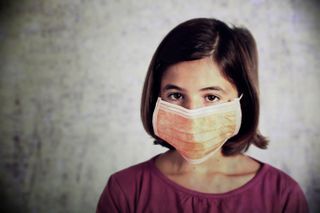
9) Washing hands isn’t as important when self-isolating
FACT: Wrong. 'If there are any external items entering your home (such as shopping, deliveries or post, for example), hand washing remains important. Every time you wash your hands you will break the chain of infection,' says Dr Gero. 'If in doubt, give them a wash! Do this for at least 20 seconds with warm, soapy water and if you have paper towels that you can throw away, this is better than using a communal towel.' Dr Gero advises that if using towels, dedicate one to each person in the house, keep them separate, and wash them daily.
10) Vinegar is good for keeping bathrooms and kitchens free of the virus
FACT: Incorrect. 'Vinegar will not work against SARS-COV-2 and is not advised. The cleaning of bathrooms, kitchens and surfaces is still best carried out with hot water from the tap and a surface detergent as you have always done,' says Dr Gero. 'If you have a case of SARS-COV-2 in your house and want to disinfect common areas, you can use a dilution of household bleach or hydrogen peroxide - this is a mild antiseptic.'
11) If you can hold your breath for 10 seconds, you don’t have coronavirus
FACT: Incorrect. 'Increasingly, we think that some people may have the infection with no symptoms at all but could still spread the infection to others. The holding-breath myth is probably based on a test called the Roth (eight second) test, which doctors used to use when assessing patients by telephone,' says Dr Dawn. 'We asked the patient to take a deep breath and then count to 30 as fast as they could, and we timed how long it took them to need to take a breath. If the patient took a breath in less than eight seconds, that suggested they had below normal oxygen levels in their system.'
12) Drinking water every 15 minutes will flush the virus down into the stomach and stop it getting you’re your lungs
FACT: Incorrect. 'I’m not sure where the basis for this myth lies, other than, even a mild fever can lead to significant excess loss of fluid in sweat, so drinking plenty of fluids is important for anyone with a temperature,' says Dr Dawn.
13) The virus is killed at temperatures over 27 degrees, so drinking regular hot drinks will protect you from infection
FACT: Incorrect. 'This probably has come from the fact that most respiratory viral illnesses (coughs and colds) tend to be more frequent in winter and disappear during the summer, but this has more to do with us spending more time outdoors in the summer and naturally socially distancing more without thinking about it,' says Dr Dawn. 'Remember, normal human body temperature is 37 degrees and the virus thrives in our lungs. Drinking hot drinks cannot prevent you getting infected.'
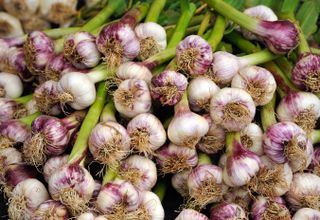
14) Eating garlic will stop you from contracting the virus
FACT: Incorrect. Garlic is thought to have some immune- boosting properties. It contains a compound called allicin. 'When garlic is crushed, this compound is converted to allicin and it is this and its breakdown products that seem to help the immune system. But, conversion to allicin is inhibited by heat, so to get the best out of garlic, you should eat it raw,' says Dr Dawn.' And believe me, if we could stop coronavirus in its tracks by getting everyone to eat raw garlic, the government wouldn’t be spending millions on personal protective equipment and extra hospital beds!'
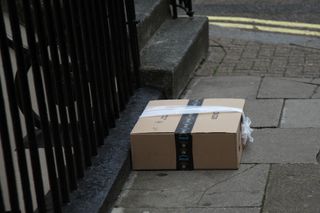
15) Leaving post or parcels outside for 15 minutes will kill off the virus
FACT: Not proven. We are still learning about how long the virus survives outside the human body. Current thinking is that it could be anything from two hours to nine days. 'It seems to last longest on hard surfaces like metals, but the risk of contamination seems to be reduced after 72 hours,' says Dr Dawn. 'Open all your post in one go, dispose of the packaging immediately, wipe down surfaces and then wash your hands.'
16) You can make effective home hand sanitisers from vodka
FACT: Incorrect. 'Vodka is around 40% alcohol and hand sanitisers have an alcohol content of anything between 60% and 95%,' says Dr Dawn.
17) Drinkable silver will prevent you contracting coronavirus
FACT: This unsafe. Silver is known to have some antimicrobial properties and is used in some dressings, 'but drinkable silver can actually have some serious side effects, including kidney damage and seizures,' says Dr Dawn.
How will I know if I have coronavirus?
Dr Dawn on the progression of symptoms...‘Although we hear a lot in the media about the need for intensive care beds to manage this pandemic, the vast majority of those affected (99%) will have a mild illness and some may have no symptoms at all.
The most common presentation would be a new cough, fever (temperature 37.8C or higher) and sometimes shortness of breath. Some patients also report fatigue, sore throat, muscle pains and headaches and a loss of sense of smell or taste.
These symptoms can appear any time from two to 14 days after exposure to the virus. Most patients recover completely within seven days although it has caused symptoms for longer in a minority.’
To protect yourself from coronavirus
Dr Dawn says we should wash our hands regularly. YouTube is home to several videos that show and explain how to do this properly. She adds that social distancing should be practiced at all times and that self-isolation is crucial if you are in a high-risk group. ‘Any adult who has been offered an annual NHS flu vaccine by their GP should consider themselves in an at-risk group and should be vigilant about social distancing.’
-
 Compromising may be killing your relationship - here are 5 ways to reach healthy compromises, according to relationship expert
Compromising may be killing your relationship - here are 5 ways to reach healthy compromises, according to relationship expertCompromising isn't always the best way to keep the peace in a relationship
By Charlie Elizabeth Culverhouse Published
-
 Best interactive pets for kids: 15 gift ideas for children of all ages
Best interactive pets for kids: 15 gift ideas for children of all agesFrom puppies to axolotls, take a look at our selection of the best interactive pets you can buy that are sure to be a hit with little animal lovers
By Sarah Handley Published